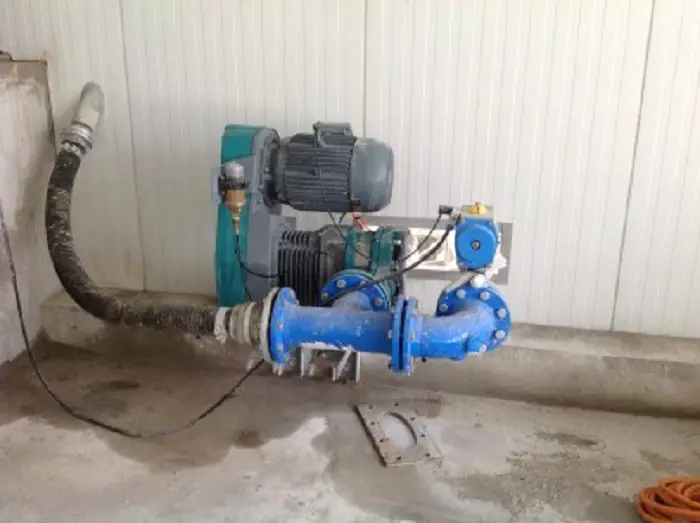In order to enable problem-free treatment of this kind of waste water in spite of this, NETZSCH Pumpen & Systeme GmbH has developed special models of its TORNADO® T2 rotary lobe pump which withstand a really wide variety of media: the T.Envi® is specially designed for a long service life with minimum wear, so that it can also convey extremely abrasive media without any problem.
A large German concrete works has been using this solution since April 2015 to transport its mineral waste water and has so far not recorded any relevant signs of wear. In contrast, the centrifugal submersible pump which had been used previously lasted scarcely half a year.
The building materials and concrete parts manufacturer regularly experiences considerable amounts of mineral waste water with pebbles up to 20 mm in size when cleaning the mixing plant. The mixture is collected in a settling tank from where it has to be conveyed to a treatment plant via a 10 m long riser for further de-watering and separation.
However, the centrifugal submersible pumps which had been used for this until 2015 did not withstand the stones and sand in the water for long due to the high speed required.
Excessive abrasion and wear meant it made no sense to carry on using the pumps after only around six months. The company therefore decided to switch to a rotary lobe pump.
Special choice of materials and design for long service lives
A T.Envi® from NETZSCH was used which is specially designed to be extremely robust and for a long service life with minimum maintenance effort.
The reason for this is an innovative mixture of materials: instead of elastomer lobes rotating in a metal housing, this involves two hardened steel lobes rotating in a rubber housing insert which is easy to replace.
Steel is less susceptible to material fatigue due to dynamic forces – of the type that arise when there is repeated stress on the elastomer or plastic rotary lobes which is otherwise common – this means longer durability of the moving components is achieved.
In addition, there is less deformation of the metal with changing temperatures, thus allowing work with lower tolerances in manufacturing which is reflected in higher efficiency. This has the added advantage that the pump can be run at a lower speed, which affords the components greater protection and reduces wear even more.
If maintenance work should still be required, the complete front can be removed in next to no time, giving access to the whole interior. Likewise, the rotary lobes can easily be removed or re-fitted separately from one another thanks to the quick-release system.
An integrated installation gauge helps with this. In combination with the smooth bi-lobe rotors and the flush-sitting seals, the unusual fastening concept onto the outside of the housing also ensures an interior which has no dead spaces where abrasive particle residues can be deposited.
Resilient, space-saving drive
A belt drive is fitted which also ensures synchronising of the shafts. This means the design has a minimum of parts, making it less susceptible to failures, simplifying maintenance and significantly reducing the required spare parts inventory in comparison to complex gear boxes. If the pump does actually get blocked and damage the toothed belt, this can be replaced without any problem just by undoing two screws.
In contrast, if a conventional gear box gets blocked, this generally leads to the pump being completely written off. A positive side effect of the slim, short design with a belt drive is the small amount of space required by the pump: the fact that the motor can be flange-mounted above the conveying chamber enables an extremely compact machine.
To compensate for future wear, the speed of the T.Envi ® was increased for the concrete manufacturer and slippage was offset by a wear plate. In addition, the customer installed automatic back-washing with a bypass line and valve control when the pump is shut down. The design also ensures that the suction hose cannot adhere.
A section of the hose shaped like a siphon guarantees the fluid supply in the pump, so that the suction head of 3 mWS can be reliably managed. This adaptation and its design, which is very tough overall, means the pump has been working without any problems since it was commissioned in April 2015 and has been conveying 18 m³/h at 3 bar. So far checks have shown hardly any wear, in spite of the mineral components in the waste water.
Conclusion
These examples – just like the experiences with the T.Envi® rotary lobe pump – show that entirely reliable and sufficiently robust conveying solutions do now exist for efficient treatment of industrial waste water and sludge. This not only opens up the opportunity for companies to improve their eco-friendliness. Appropriate systems also enable recycling of raw materials that are sometimes valuable and reduce the outlay for storage and disposal of waste water. In this connection, customised pumping concepts can make an important contribution to operational reliability and ultimately to efficiency.
For more than 60 years, NETZSCH Pumps & Systems has served markets worldwide with NEMO® progressing cavity pumps, TORNADO® rotary lobe pumps, NOTOS® screw pumps, grinding machines, barrel emptying systems, dosing systems and accessories, providing customised, sophisticated solutions for applications in every type of industry. With a workforce of over 2,000 and a turnover of more than 260 million euros (2015 financial year), NETZSCH Pumps & Systems is the largest business unit with the highest turnover in the NETZSCH Group, alongside NETZSCH Analysing & Testing and NETZSCH Grinding & Dispersing.
Contact:
NETZSCH Pumpen & Systeme GmbH
Geretsrieder Strasse 1
84478 Waldkraiburg
Germany
Phone: +49 8638 63-0
Fax: +49 8638 67981
[email protected]
www.netzsch.com
